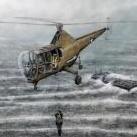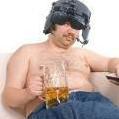-
Posts
62 -
Joined
-
Last visited
Lockjaw's Achievements

Crew Dawg (2/4)
58
Reputation
-

ANG Pay System Explained (AFTP, UTA, Title 10/32)
Lockjaw replied to a topic in Air National Guard / Air Force Reserves
"2" for the RQS side of the house. We want our young guys and girls getting exposure to different areas/assets/scenarios. There are exceptions, but in most cases you'll be a priority. -

ANG Pay System Explained (AFTP, UTA, Title 10/32)
Lockjaw replied to a topic in Air National Guard / Air Force Reserves
It depends. Are enough people raising their hands to go, where they don't NEED you to go? Then no, you won't NEED to go - unless you're already fragged for that as part of an upgrade, you're a junior guy who needs the experience, etc. If there aren't enough volunteers (AKA - the trip probably sucks, or the ops tempo has been high), then...you're probably going if you're on orders/AGR. -
Yup. I (since March 2020) work nearly all remote. Granted, my former in-person location is only about 30 mins from where i live, but my Guard gig is around 2.5 hrs. I did have a lot of in-person interaction with my supervision before we ended up going remote, so YMMV, but so far it's been pretty painless. I do miss some aspects of in-person work - the socialization primarily, as well as the ability of being able to track someone down and talk face to face if they aren't answering calls/e-mails - but I don't miss the commute time and it is helpful with two little ones to be able to knock out some household stuff when time allows during the day.
-
To answer your first question, here is a great introduction to something you'll hear a lot if you decide to pursue military aviation. It depends. But really, it does, based on what job you have. Crew chief? 100%. Backshop (i.e. Comm/Nav, Engines, Weapons, etc) will still get you interaction as well. They aren't pilots, but we ended up with multiple SMAs out of our maintenance community. We had a supply troop attached to our squadron. He is a SMA as well now. Be sharp, be motivated, and be friendly. At some point, make your wishes known to one of the pilots or other aircrew. They'll remember and can also probably give you good data. Our squadron has also seen enlisted aircrew from another MDS and comm personnel become pilots. I don't have any solutions for your geographic dilemma or the Reserve to AD transfer chances. You probably need to sit down and pro/con list this decision, and then decide on your primary and alternate courses of action. I wasn't a prior E, so I can't help you there, but I know many success stories from taking that path.
-
Thread winner.
-
You can also consider writing a short message on the bottle with a sharpie. Something simple like "Thanks for your time/consideration, etc" and your name. More than once I've gone to a bottle, asked "who the hell brought this?" and then learned about a promising prospect.
-
As a 60G guy, with some prior EMS experience, I'm scratching my head too. In terms of the fuel - I know the Coastie 60s have some substanial modifications for carrying additional fuel. I don't believe the Navy models carry that much, to get them beyond 500NM with reserves at least, but I could be wrong. They do have the ability to fuel up on ships capable of taking them, or doing HIFR (Helicopter In Flight Refueling), in which they hover next to a moving vessel, take up a fuel hose, and then connect the hose to provide fuel while flying - which seems like a nightmare to someone who does HAAR pretty regularly. Both of those would obviously extend the time to get someone to the beach, though. EDIT: Unless the details about the altitude variation are incorrect, and for whatever reason the 22 guys were adamant at flying an enroute altitude which would cause issues for a head injury.
-
Well I mean considering the last RCT quoted was conducted in 2018...I don't think it's ballwash. But hey man, you do you. Also, I'm not deliberately being picky, but the N95 is technically considered a respirator, and the studies were mainly looking at surgical style masks. I'll reiterate what I've said - N95s when properly fitted, properly worn, and used once, are helpful. If you don't do any or all of that, your protection will be substantially less. And no, I don't selectively believe - but my trust in the CDC has gone down the tubes since Summer 2020. I am calling attention to the fact that we went from over 70 years of data showing "this doesn't work," to "this works, but only against this one new virus," to then "this works against every respiratory virus," in the span of less than 3 years, with hardly any RCTs conducted to prove it. Correlation is not causation. I think we've all seen enough "experts" be proven wrong recently, yet instead of showing humility when the data is inconclusive or shows otherwise, simply dig in their heels more, because it's 2022 - and experts can never be wrong these days.
-
You are aware that the CDC itself stated that 10 Randomized Controlled Trials from 1946-2018 found no significant reduction in influenza transmission with the use of face masks?
-
Yup, tracking. That said, the data is convincing that seatbelts significantly reduce the possibility of people from being thrown about like rag dolls in a significant car accident/rollover. Do they fail occasionally? Yes. Do people who wear them still die because of other factors? Yes. Been to a lot of accidents. Still haven't seen a vehicle come with a disclaimer that the restraining devices "will not provide any protection." If you hate wearing the thing and think it's pointless...why are you fine with mandatory usage in one particular environment? I'm honestly curious, I'm not trying to be a smartass. I'll reiterate: N95s are effective against airborne infections, but they need to be properly fitted and used once. Medical gloves or Tyvek suits aren't used more than once - and there are good reasons for that.
-
Look man, I agree the ad hominem was uncalled for (as it is in any environment). But your comparison is BS. Have you ever seen a seatbelt disclaimer in an automobile manual, warning people that it may not protect them in a collision? Have you ever seen an alcoholic beverage container tell people that driving after drinking it is just fine? Because here's the thing. Any surgical mask container you pick up ever since it became popular post COVID has a disclaimer about how it is not tested to protect against COVID 19 on the side. I'll say it again. If you want to mask up, go for it. The evidence for it is...not great. Therefore, it should not be mandated in normal medical settings in view of its downsides for medical treatment and communication.
-
I think the medical community has lost a lot of trust. Pretty sure I posted about this a few pages (or more?) back. Again from my EMS background, I knew people in the northeast who were in the thick of it from March of 2020 onward for a number of months. They had terrible stories. Some of them were understandably quite vocal from their experiences about people taking precautions, mandates being needed, and that people should just listen to "the experts." (Side note: Many of them spoke of being overwhelmed, and I have no doubt about that - but there have also been plenty of hospital closures/total bed losses leading up to 2020. This reduced capacity, partially because hospital CEOs wanted to run leaner operations.) The problem is that when circumstances change/new data arises, experts these days seem to not adjust. I asked some of my friends if, when we go to war, the country should just be quiet and listen to the "experts" (generals, DOD civilian leadership, etc) regardless of what else is seen or heard. We were constantly turning the corner in AFG. Some of them got it. Some didn't. The more the experts dug in their heels, the more people started losing trust in the medical community. And when hospital CEOs started letting their infectious disease specialists (who are some of the most hypochondriac/risk averse people out there) make lots of decisions for the entire hospital community, further trust was lost. People weren't allowed to be with their loved ones when they passed. Fathers weren't allowed to be present for births. Plenty of other boneheaded decisions as well, which I and others eventually saw as not so much needed to control the virus, but which instead made life easier for some of the less friendly or cordial medical professionals (and there are plenty of them out there, unfortunately). I have no problem with people choosing to wear a mask - and if the data ever overwhelmingly supports it (like smoking and secondhand smoke is bad for you), places requiring people with certain symptoms to be masked. Masks for all, no matter what, all the time, is a silly policy, and the field would be much better off investing in HVAC/ventilation upgrades.
-
From my prehospital care knowledge (working EMS), the data on surgical masks doing good against respiratory illness is unsettled at best (hence why there is normally a disclaimer on the boxes). There are even studies suggesting they aren't that great at blocking fluids, etc, in a surgical environment and that plastic face shields would be better for that purpose. Yes, N95s can be useful for protecting a user against tuberculosis and other such illnesses, but they are a royal PITA to wear when worn properly and are only supposed to be used once (just like medical gloves or pretty much any other PPE). We always donned 95s when we suspected a patient had TB and the ER staff would do the same, even placing them in a particular room for isolation (when facilities were available). ICUs would go further for certain types of infectious diseases, utilizing things like Tyvek suits or respirators - which is understandable when you are in close proximity of a particular individual with a very infectious and harmful illness for long periods of time, performing treatments/intervention - but they would only be used for that patient's room. It was not common and certainly not mandatory to be wearing a mask in a "normal" medical environment. They hinder communication, are uncomfortable when worn properly, and are really only usable once, if you want them to be as effective as advertised.
-
We need a full blown debrief process for the response to this thing. Clear errors by humans, which I understand. I've messed up more than I can count - but fess up to it; I'll respect you more even in a real world situation. That's been the most mind blowing thing - people refuse to take any responsibility.







